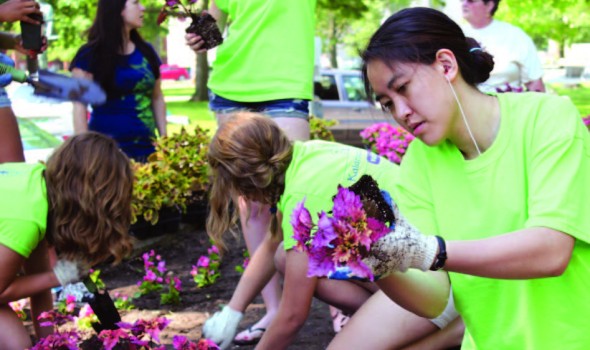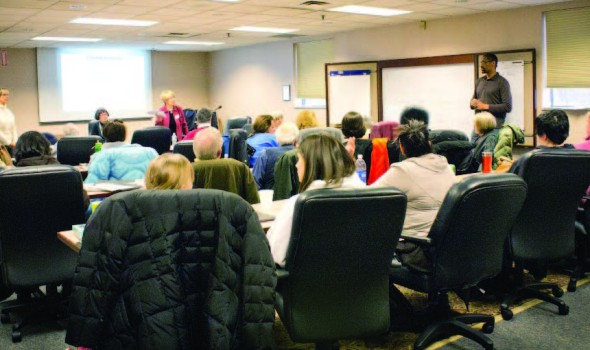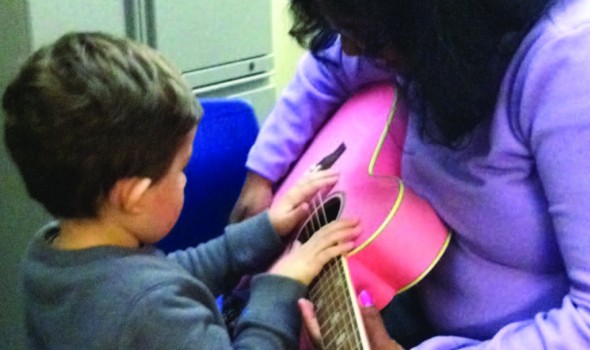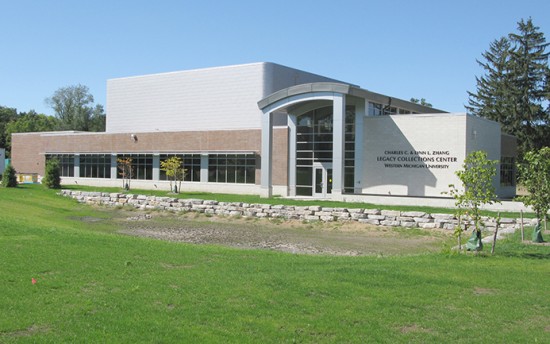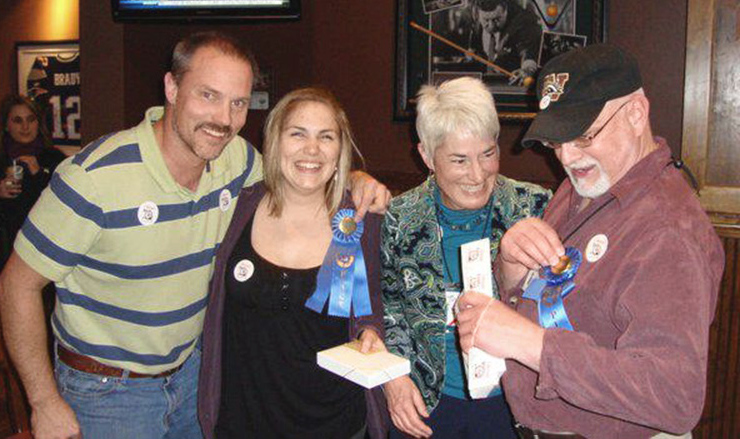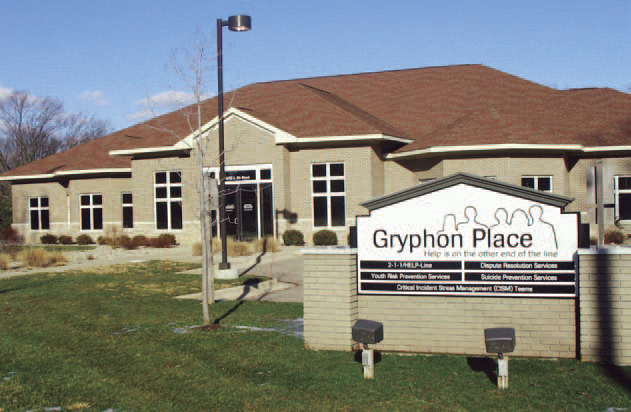Kalamazoo in Bloom celebrates 30 years in 2014. To honor this occasion, Kalamazoo in Bloom is coordinating a late summer KalamaZOO Hop in collaboration with six Kalamazoo neighborhoods, Kalamazoo County Parks & Recreation Department, Portage, Comstock and several other organizations to create a series of activities and attractions open to the public. As part of Kalamazoo in Bloom’s annual plantings, topiaries in the shape of animals are being purchased together with flowers for beds throughout Kalamazoo, Comstock and Portage, as well as in each of the six collaborating City of Kalamazoo neighborhoods. The collaboration with the neighborhoods also involves a special art project in which a group of neighborhood youth, under the instruction of a neighborhood artist, will create meaningful pieces of public art that will be on display in Bronson Park for one week, then permanently installed in the respective neighborhoods. One of Kalamazoo in Bloom’s purposes is to engage the community in the creative process of placemaking, as well as the enjoyment of those places created, by inviting participation from all sectors of the diverse communities served. Kalamazoo in Bloom is honored to be collaborating with many partners on the KalamaZOO Hop project that, like Kalamazoo in Bloom, have a passion for creating vibrant communities and enhancing quality of life for residents.
“We believe that literacy for one means change for all.” The Kalamazoo Literacy Council is a nonprofit volunteer tutor organization dedicated to enhancing the lives of illiterate adults through free one-on-one programs designed to develop reading, writing and spelling skills. Through the council’s efforts we hope to also educate the public about the crisis of illiteracy and bring together a community with a common goal of making Kalamazoo County 100 percent literate. For 40 years the KLC has recruited, trained and equipped volunteers to tutor adults in need of literacy services. Currently, the KLC has 186 active tutors assisting 265 adults in need of literacy education. It has established 10 Community Literacy Centers that provide quality adult literacy services at the neighborhood level. It has built a functional community-wide collaborative whose collective work has positive impacts on a local, regional and state level. The agencies of the Adult Literacy Collaborative of Kalamazoo County led by the KLC are serving more than 1,700 adult learners who are reading below the 6th grade level. The KLC is now the preeminent messenger and advocate for adult literacy in Kalamazoo County. In Kalamazoo County, over 25,000 people or 13% of adults cannot read a simple story to a child, an intersection on a map, a prescription label, or total purchases from an order form. They struggle daily to take part in the world around them and fail to reach their full potential as parents, community members, and employees because they lack basic reading skills. To make some demonstrable progress in this area, the KLC and its collaborating organizations have set a goal of collectively reaching no less than 20% annually (approximately 5,000) within three years, with increasing numbers served each year beyond. To achieve this, the KLC launched the ENT-R (Everyone Needs to Read) Adult Literacy Initiative in January 2011 to mobilize new and existing community assets to build a comprehensive system that provides literacy education to adults in the county and strengthens and sustains the administrative and programmatic infrastructure that provides these services.
One of the behavioral treatments used successfully with persons diagnosed with special needs is Music Therapy. Music Therapy is the skillful use of music as a therapeutic tool to restore, maintain and improve mental, physical and emotional health. Music Therapy is much more than a pleasant music interlude or entertainment. The non-verbal, creative and affective nature of music facilitates contact, self-expression, communication and growth. Music Therapy can be used to facilitate physical wellness, encourage positive social interactions, improve interpersonal relationships, nurture appropriate emotional expression, and increase self-awareness. Music Therapy is not overly concerned with the “correctness” of music or how the music is played, but instead is focused on the growth potential achieved through music. According to Dr. Clive Robbins, “Almost all children respond to music. Music is an open-sesame, and if you can use it carefully and appropriately, you can reach into that child’s potential for development.” The Nordoff-Robbins Music Therapy Clinic uses music therapy to help 100 handicapped children learn and to relate and communicate with others.
At the Kalamazoo Book Arts Center (Book Arts) you can print on a 100-year-old press, learn to make paper and set type, bind books, and explore the vast world of book arts. Since 2005 founder Jeff Abshear has attracted students aged 6 – 80+, artists, interns, and the “book curious” to revive and preserve the book arts.
A classroom and studio, gallery and shop, the Book Arts is a destination for visiting artists and writers from around the country. Master printmakers, makers of miniature books, pop-up book artists, and poets take time to share their craft, work in a classroom setting with students of all abilities, and create unique works of art in the Book Arts studio. The Book Arts’ own Poets in Print presents award-winning writers and is recognized as one of the best reading series in the Midwest. Exhibits vary from the invitational accordion books show in May (which draws international entries), to student, member and faculty shows, and exhibits that bring in celebrated artists from near and far.
The Make a Book from Scratch class is a perennial
favorite with K-12 students who create their own books of poetry. “I’ll never tire of seeing the delight on their faces when they realize they’ve made something with their own hands,” says Abshear. Or as one student put it, “I love getting messy with pulp!”
For over 30 years, Ministry with Community (Ministry) has been opening its doors to those who are struggling in Kalamazoo. Whether the issue is homelessness, poverty, unemployment, substance dependency, or mental illness, everyone is welcomed into an atmosphere of respect, compassion and unconditional acceptance to begin the process of rebuilding their lives. As Kalamazoo’s only daytime shelter and resource center, Ministry works to meet individuals’ basic needs with meals, showers, laundry facilities, and mail and telephone access. Ministry’s services then go deeper, with social work, counseling, employment support, and educational and enrichment opportunities.
Ministry is also part of a dedicated group of human service agencies in Kalamazoo, and works to marshal the resources available while removing barriers. Ministry acts as a venue for its partners to provide services Kalamazoo Gay Lesbian Resource Center on-site, including Kalamazoo Loaves and Fishes, Legal Aid of West Michigan, Housing Resources, Community Mental Health and Substance Abuse Services, CARES, and many others.
A vibrant community is one in which all people, regardless of backgrounds or circumstances, are afforded the chance to be respected, supported, and ultimately, self-sufficient. That work begins at Ministry.
The Archives and Regional History Collections at Western Michigan University have the responsibility and honor of housing historical documents from across the region and state, as well as providing an accessible location that allows for research and learning. A new building is under construction on Oakland Drive that will bring together all of the regional history and archives collections. The Charles C. and Lynn L. Zhang Legacy Collections Center (Center) will offer an environment conducive to discovering the past while welcoming the greater community to research and learn.
The state-of-the-art building will not only feature spacesaving storage technology that will make all documents easy to access, but also provide climate controls to preserve the condition of those items. The building is aiming for LEED Certification through the use of sustainable materials and efficient heating, cooling, and electrical operations. The Center will preserve the documents of the past and allow for the continual growth of the collections by providing a place for the community, and future generations, to celebrate history.
The Center, set for completion in the fall of 2013, is not just an educational asset, it is also a community resource. In 1962 the University Archives and Regional History Collections were designated as a repository for regional history by the Michigan Historical Commission. The collection contains documents from 12 southwest Michigan counties including court documents, civil records, photographs, maps, and more. Holdings include the archives for the Kalamazoo Gazette, letters from the Civil War, and the French-Michilimackinac Research and Translation Project. Free and open to the public, the Center will serve as an accessible resource for the entire southwest Michigan community. From K-12 students working on school assignments, to youth engaged in projects for their after-school programs, to college students conducting research for history theses, to adults exploring family histories, the Center will be open to all.
Recognizing the persistent and growing challenges facing nonprofit organizations in Kalamazoo County, a task force of area foundation representatives and nonprofit leaders sought a centralized support center to assume a variety of capacity-building and technical assistance efforts. After much research and deliberation, the task force selected the Kalamazoo Public Library to house and operate the center because of its accessibility, strong infrastructure, neutrality, information-based mission, and reputation as a strong collaborative leader. ONEplace@kpl
(ONEplace) opened in March 2009 providing a full slate of online and print resources plus a complete schedule of webinars and workshops. Since its inception ONEplace has provided opportunities for nonprofit leadership to improve performance and achieve excellence throughout their organizations. All programs and services are offered at no cost to the participants, making this the most accessible and inclusive management support organization in the state.
Today, ONEplace serves as the education arm of the funding community. By addressing the professional development needs of existing nonprofit organizations and encouraging the creation of only the most promising new nonprofits, ONEplace encourages the wise, effective use of charitable dollars and serves as a catalyst for community success.
Area nonprofit organizations have a place to ask questions, access resources, and receive training. It’s their ONEplace.
Community AIDS Resource & Education Services of Southwest Michigan (CARES) contributes to the vibrancy of the Kalamazoo community by keeping Kalamazoo healthy. We help our citizens living with HIV live longer and healthier lives. CARES also works to prevent HIV in our community through education and testing.
CARES was started in 1985 by a group of volunteers concerned with their friends dying of a disease that no one was talking about. That group began supportive services for people dying and their families. As the disease has changed, so has CARES. We now provide access for people living with HIV to life-saving medications and treatment, and assist in removing barriers, including homelessness and poverty.
CARES relies on the existing comprehensive network of social service and health care providers in our community to help support the health of each individual and to help remove the barriers that may be preventing it. By providing direct services where we have the greatest experience and expertise and by referring our clients to other agencies specializing in complementary areas of expertise, we have created a community network
that can support everyone as we continue our journey towards healthier lives and a healthier community.
CARES is also addressing some of the long-term predictors of health by investing in minority youth leadership development programs, anti-stigma campaigns, and long- term HIV survivor programs. Through these initiatives CARES makes our community more inclusive and supportive. Indeed, CARES helps members of our disenfranchised populations to find their voices, connect with others, and engage in community conversations.
Little seeds can mature into trees that nurture a community in unexpected ways. Such a seed was planted in September 1939 when a young man named Eugene Andrie founded the Kalamazoo Little Symphony, an audition-based youth orchestra.
Almost 75 years later the Little Symphony has grown into the Kalamazoo Junior Symphony Society (Junior Symphony Society), a canopy organization that supports four orchestras (Training, Concert, Symphonic and Junior Symphony). The Kalamazoo Junior Symphony, now under the expert leadership of Conductor and Music Director Andrew Koehler, offers affordable, high-quality concerts at the historic Chenery Auditorium.
In addition to providing an intensive musical education for its members, the Junior Symphony Society has a long history of community outreach. Ensembles On The Road sends some of the Junior Symphony’s most advanced musicians to educate, perform, answer questions and offer instrument petting zoos to the Boys and Girls Clubs, area elementary and middle schools, developmentally disabled youth facilities, and senior citizen residences, among others.
To extend its reach the Junior Symphony Society is excited to launch its 75th Anniversary Scholarship Fund Drive with the aim of raising $150,000 in scholarship money. In the last few years Kalamazoo has experienced a unique surge in music programs that serve disadvantaged youth, including the Kalamazoo Symphony and Crescendo Academy’s Marvelous Music as well as the Kalamazoo Symphony and Communities in Schools’ Kids in Tune, for which many Junior Symphony Society musicians serve as mentors. With the next 25 years in mind, the Junior Symphony Society looks forward to the upcoming centennial as it prepares to welcome the musicians of tomorrow.
Established by private citizens concerned about the impact of drugs on youth, Gryphon Place (Gryphon) has been a part of the Kalamazoo County Community since 1970. From very humble beginnings in the old fire station on South Westnedge, the agency has grown and changed in response to community needs ever since. Gryphon has stepped into roles that no one else was filling in our community and now is a critical part of the entire human services system across the county.
Early planners had a vision that “there should be a 9-1-1 for human services, … a single number to call to access a spectrum of human services and for help in crisis situations.” This is the essence of what Gryphon Place has become over the years. That human services 9-1-1 number is now 2-1-1, a simple-to-remember 3-digit dial-up for 24/7 assistance in accessing health and human services in our community. The place to call when in personal crisis, Gryphon remains the leader in Suicide Prevention in Kalamazoo County and throughout the entire state of Michigan.
Gryphon’s online searchable database of resources is available to all citizens with internet access, and is particularly useful to other human service agencies and professionals. Gryphon also delivers Youth Risk Prevention Services in schools across southwest Michigan. Add in community mediation services to resolve conflicts and you have Gryphon, helping people find solutions in Kalamazoo County for over 43 years.
